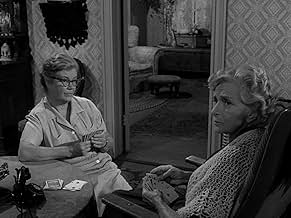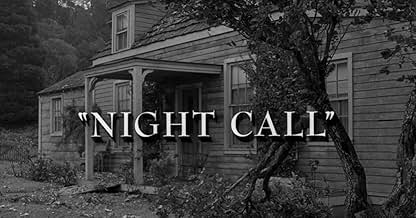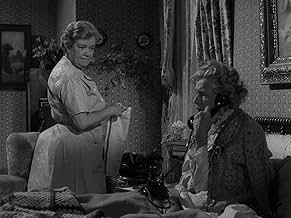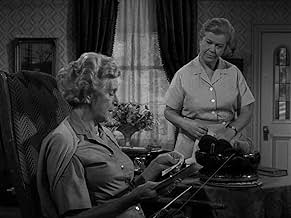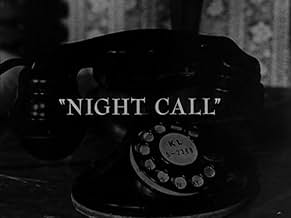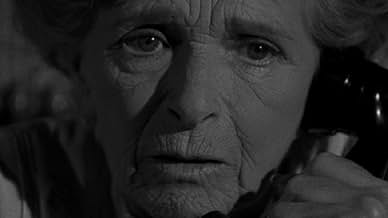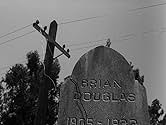Night Call
- एपिसोड aired 7 फ़र॰ 1964
- TV-PG
- 25 मि
IMDb रेटिंग
8.1/10
2.7 हज़ार
आपकी रेटिंग
अपनी भाषा में प्लॉट जोड़ेंLate-night telephone calls begin to haunt disabled elderly Elva Keene at her sequestered home in rural Maine.Late-night telephone calls begin to haunt disabled elderly Elva Keene at her sequestered home in rural Maine.Late-night telephone calls begin to haunt disabled elderly Elva Keene at her sequestered home in rural Maine.
- निर्देशक
- लेखक
- स्टार
फ़ीचर्ड समीक्षाएं
Perhaps not, but it has to be in the top three, if pure tension, terror and mystery are any measure of the best The Twilight Zone had to offer during its relatively short original run. Adapted from the tightly wound short story 'Long Distance Call', penned by the legendary Richard Matheson (who wrote 15 other TZ episodes, most notably 'Nightmare at 20,000 Feet'), 'Night Call' packs a wallop of fear. Everyone knows how jarring a phone call can be in the wee hours; the quiet of the evening suddenly jangled out of rest by the ringing we normally find a minor annoyance in the daylight. Our nerves are shot for a moment, and then we begin wondering, before we've gotten out of bed to answer the ring... "Who could it be? Is everything alright?" But to find... no one? Silence? Then, a few rings later... an unearthly moaning? The full meaning of the story only becomes apparent in the last few minutes, as is typical for the average TZ episode, but it also packs a punch, turning fear to pathos. The acting is superb, Ms. Cooper really was a fine actress and was perfectly cast here. Her face is so expressive, her fear so palpable that we have no choice but to 'fear' right along, until we find out who... or what... has been calling. And why. This is my personal favorite, for its subtlety and atmosphere. No aliens, no monsters (well, not conventionally), no spaceships, no end of the world preaching, just a good story well told. One you'd hear (or if you were brilliant enough, tell) around a campfire. Simple, clean, and terrifying.
Gladys Cooper might does not hold the record for appearances in episodes of "The Twilight Zone", though she comes close with three appearances (I think that would be Jack Klugman with four). "Night Call" represents her final appearance, though my favorite is still "Nothing in the Dark".
This episode consists of an old lady that is wheelchair-bound who is receiving creepy phone calls. It's not what is said as much as how the unknown person sounds--almost like someone who is half-dead. Again and again he calls and each time, Cooper becomes more scared--she just wants the calls to stop. Then, in a final act of desperation, she makes them stop...but is this what she REALLY wants? Much of what is good about this episode isn't the plot but how it is handled. The story idea is very simple but combining the cinematography, music, acting and direction, it all becomes amazingly tense and creepy.
This episode consists of an old lady that is wheelchair-bound who is receiving creepy phone calls. It's not what is said as much as how the unknown person sounds--almost like someone who is half-dead. Again and again he calls and each time, Cooper becomes more scared--she just wants the calls to stop. Then, in a final act of desperation, she makes them stop...but is this what she REALLY wants? Much of what is good about this episode isn't the plot but how it is handled. The story idea is very simple but combining the cinematography, music, acting and direction, it all becomes amazingly tense and creepy.
10Pythe
Unlike most of the creepier Twilight Zone episodes, Night Call terrifies me as much now as it did when I was much younger. I still can't watch this one late at night without feeling a little uneasy at what might be lurking just beyond the blinds in the window. Night Call is brilliant on several levels. First, it's a masterpiece of storytelling by the legendary Richard Matheson, who's written some of the most unnerving short stories ever published. The characters, the situation, and the final explanation are all superbly realized--I've seen the ending twist repeated in a number of short films or generic "scary tales for children"-esquire compilations. Jacques Tourneur's direction is extraordinarily atmospheric, the visual equivalent of a lonely wind rustling through a dark forest. We as viewers feel every bit as alone and frightened as the woman when she picks up the phone and hears nothing but moans from the other end. Watching the episode is a bit like lying in bed in the middle of the night and thinking you heard a noise downstairs. Yet, in spite of all this, the ending manages a complete 180, from terrifying to tragic, that works extraordinarily well. Kudos to the writer and director for giving the Twilight Zone an ingenious entry for its final season.
Once upon a time, before cells and mobile phones there was something called a party line, which was a cost effective way for low income people to maintain telephone service without having to pay a lot. The solution was simple: share the expenses (and the monthly charge) with someone else. The only problem would be that one could not make or receive calls if the other person was on the line.
In this Twilight Zone episode, Night Call, the elderly, invalid Elva Keene, who lives alone, cared for only by a nurse, starts to receive phone calls from someone who sounds far away. It's a man's voice but she can't quite hear what he's saying. He tends to call her late at night, when she's alone, and these calls frighten her. As we learn a thing or two about Miss Keene's past we begin to understand her, as we come to realize that she has a bad conscience, and for good reason. These unsettling phone calls are bringing back memories, as she recalls experiences from her youth; and hers is not a party line.
This is one of the few entries in the Twilight Zones series that plays like a pure horror from start to finish. Not a violent or gruesome horror; more like a ghost story. Written and directed by masters, Richard Matheson and Jacques Tourneur, splendidly acted by Gladys Cooper in the lead role, it ends on a note of sheer terror. No axes come crashing through doors, there are no vampires, werewolves or monsters, just an image and no more. Those who keep their phones next to their beds might want to think twice about leaving them on after watching Night Call.
In this Twilight Zone episode, Night Call, the elderly, invalid Elva Keene, who lives alone, cared for only by a nurse, starts to receive phone calls from someone who sounds far away. It's a man's voice but she can't quite hear what he's saying. He tends to call her late at night, when she's alone, and these calls frighten her. As we learn a thing or two about Miss Keene's past we begin to understand her, as we come to realize that she has a bad conscience, and for good reason. These unsettling phone calls are bringing back memories, as she recalls experiences from her youth; and hers is not a party line.
This is one of the few entries in the Twilight Zones series that plays like a pure horror from start to finish. Not a violent or gruesome horror; more like a ghost story. Written and directed by masters, Richard Matheson and Jacques Tourneur, splendidly acted by Gladys Cooper in the lead role, it ends on a note of sheer terror. No axes come crashing through doors, there are no vampires, werewolves or monsters, just an image and no more. Those who keep their phones next to their beds might want to think twice about leaving them on after watching Night Call.
Gladys Cooper, the grand dame of The Twilight Zone, is quite brilliant in her third and final appearance. Jacques Tourner (Night Of The Demon, I Walked With A Zombie) brings his usual excellent atmospheric direction to the Zone. Probably the only TZ set in England (I realize 'Passage On The Lady Anne' begins at Southampton), it's by far and away one of the most creepy and chilling.
Besides Gladys Cooper, the so recurring theme of loneliness is probably the only other typical TZ factor. The story is good for a chilly ghost story but somewhat severe in nature for this normally more warm-hearted series.
Besides Gladys Cooper, the so recurring theme of loneliness is probably the only other typical TZ factor. The story is good for a chilly ghost story but somewhat severe in nature for this normally more warm-hearted series.
क्या आपको पता है
- ट्रिवियाThe title of Richard Matheson's original short story is "Long Distance Call". However, as there was already an episode of The Twilight Zone (1959) with this title, Long Distance Call (1961), the title of this episode had to be changed.
- गूफ़When Elva is sitting in her car at the cemetery, there's a man's face visible to the left of her head, reflected in one of the car windows, and then it's replaced by a hand twisting something. It is unclear what is being twisted, since the camera isn't moving at the time.
- भाव
[closing narration]
Narrator: According to the Bible, God created the heavens and the Earth. It is man's prerogative and woman's, to create their own particular and private hell. Case in point, Miss Elva Keene, who in every sense has made her own bed and now must lie in it sadder, but wiser by dint of a rather painful lesson in responsibility transmitted from - The Twilight Zone.
- कनेक्शनFeatured in WatchMojo: Top 10 Creepiest Twilight Zone Moments (2018)
टॉप पसंद
रेटिंग देने के लिए साइन-इन करें और वैयक्तिकृत सुझावों के लिए वॉचलिस्ट करें
विवरण
- चलने की अवधि25 मिनट
- रंग
- पक्ष अनुपात
- 1.33 : 1
इस पेज में योगदान दें
किसी बदलाव का सुझाव दें या अनुपलब्ध कॉन्टेंट जोड़ें


